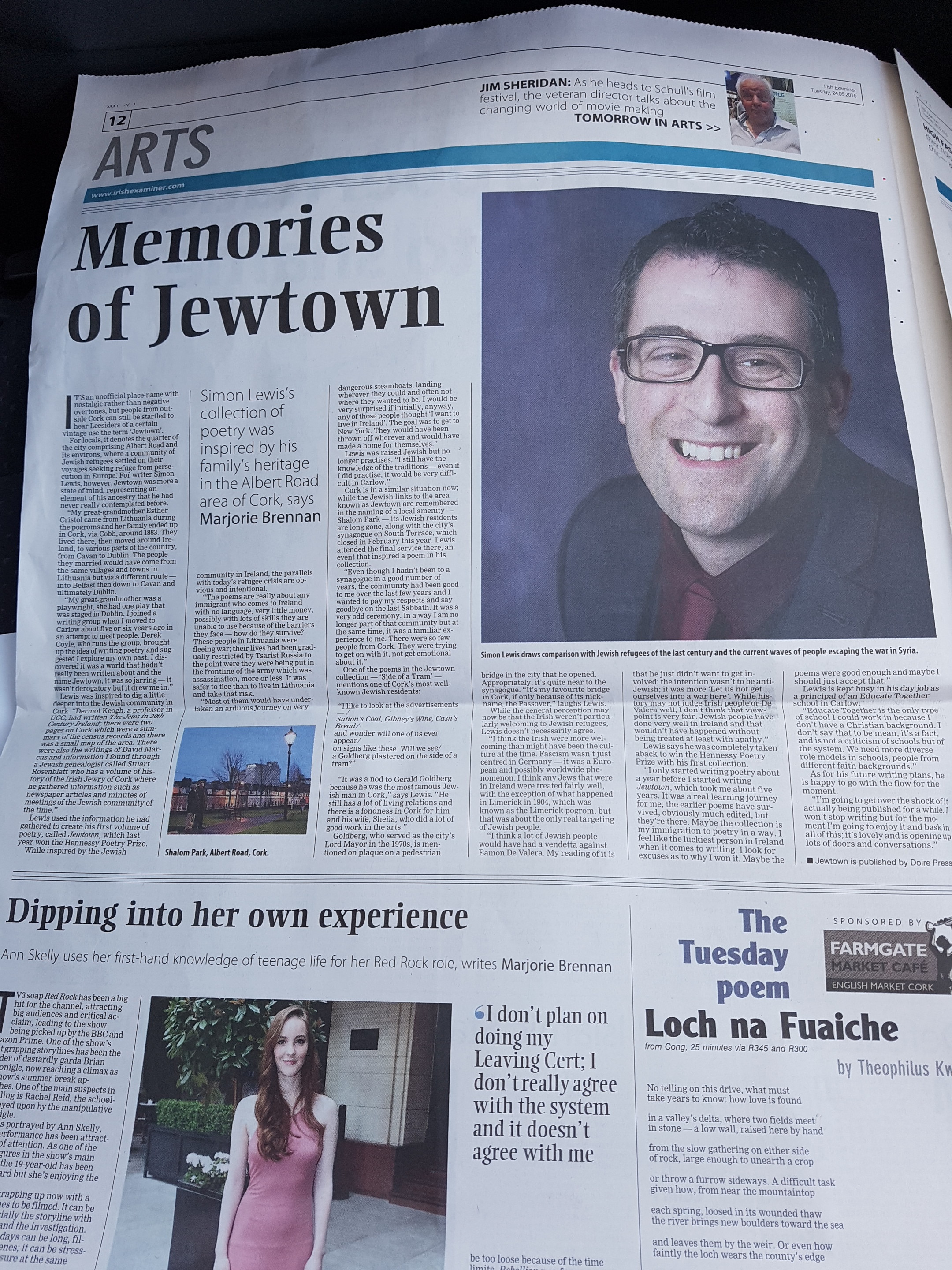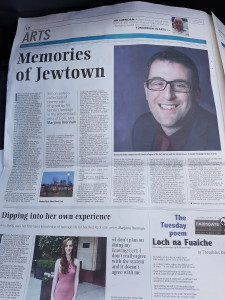I was delighted to see a huge article in the Irish Examiner about my upcoming collection, Jewtown. The article is mostly about the area of Cork which was known as Jewtown but also concentrates a little bit about my own background and heritage. The full text can be read on the Irish Examiner web site, which I’m also pasting below.
Memories of Jewtown in Cork recalled in poetry collection
Simon Lewis’s collection of poetry was inspired by his family’s heritage in the Albert Road area of Cork, says Marjorie Brennan
IT’S an unofficial place-name with nostalgic rather than negative overtones, but people from outside Cork can still be startled to hear Leesiders of a certain vintage use the term ‘Jewtown’.
For locals, it denotes the quarter of the city comprising Albert Road and its environs, where a community of Jewish refugees settled on their voyages seeking refuge from persecution in Europe. For writer Simon Lewis, however, Jewtown was more a state of mind, representing an element of his ancestry that he had never really contemplated before.
“My great-grandmother Esther Cristol came from Lithuania during the pogroms and her family ended up in Cork, via Cobh, around 1883. They lived there, then moved around Ireland, to various parts of the country, from Cavan to Dublin. The people they married would have come from the same villages and towns in Lithuania but via a different route — into Belfast then down to Cavan and ultimately Dublin.
“My great-grandmother was a playwright, she had one play that was staged in Dublin. I joined a writing group when I moved to Carlow about five or six years ago in an attempt to meet people. Derek Coyle, who runs the group, brought up the idea of writing poetry and suggested I explore my own past. I discovered it was a world that hadn’t really been written about and the name Jewtown, it was so jarring — it wasn’t derogatory but it drew me in.”
Lewis was inspired to dig a little deeper into the Jewish community in Cork. “Dermot Keogh, a professor in UCC, had written The Jews in 20th Century Ireland; there were two pages on Cork which were a summary of the census records and there was a small map of the area. There were also the writings of David Marcus and information I found through a Jewish genealogist called Stuart Rosenblatt who has a volume of history of the Irish Jewry of Cork where he gathered information such as newspaper articles and minutes of meetings of the Jewish community of the time.”
Lewis used the information he had gathered to create his first volume of poetry, called Jewtown, which last year won the Hennessy Poetry Prize.
While inspired by the Jewish community in Ireland, the parallels with today’s refugee crisis are obvious and intentional.
“The poems are really about any immigrant who comes to Ireland with no language, very little money, possibly with lots of skills they are unable to use because of the barriers they face — how do they survive? These people in Lithuania were fleeing war; their lives had been gradually restricted by Tsarist Russia to the point were they were being put in the frontline of the army which was assassination, more or less. It was safer to flee than to live in Lithuania and take that risk.
“Most of them would have undertaken an arduous journey on very dangerous steamboats, landing wherever they could and often not where they wanted to be. I would be very surprised if initially, anyway, any of those people thought ‘I want to live in Ireland’. The goal was to get to New York. They would have been thrown off wherever and would have made a home for themselves.”
Lewis was raised Jewish but no longer practises. “I still have the knowledge of the traditions — even if I did practise, it would be very difficult in Carlow.”
Cork is in a similar situation now; while the Jewish links to the area known as Jewtown are remembered in the naming of a local amenity — Shalom Park — its Jewish residents are long gone, along with the city’s synagogue on South Terrace, which closed in February this year. Lewis attended the final service there, an event that inspired a poem in his collection.
“Even though I hadn’t been to a synagogue in a good number of years, the community had been good to me over the last few years and I wanted to pay my respects and say goodbye on the last Sabbath. It was a very odd ceremony. In a way I am no longer part of that community but at the same time, it was a familiar experience to me. There were so few people from Cork. They were trying to get on with it, not get emotional about it.”
One of the poems in the Jewtown collection — ‘Side of a Tram’ — mentions one of Cork’s most well-known Jewish residents:
“I like to look at the advertisements — /
Sutton’s Coal, Gibney’s Wine, Cash’s Bread/
and wonder will one of us ever appear/
on signs like these. Will we see/
a Goldberg plastered on the side of a tram?”
“It was a nod to Gerald Goldberg because he was the most famous Jewish man in Cork,” says Lewis. “He still has a lot of living relations and there is a fondness in Cork for him and his wife, Sheila, who did a lot of good work in the arts.”
Goldberg, who served as the city’s Lord Mayor in the 1970s, is mentioned on plaque on a pedestrian bridge in the city that he opened. Appropriately, it’s quite near to the synagogue. “It’s my favourite bridge in Cork, if only because of its nickname, the Passover,” laughs Lewis.
While the general perception may now be that the Irish weren’t particularly welcoming to Jewish refugees, Lewis doesn’t necessarily agree.
“I think the Irish were more welcoming than might have been the culture at the time. Fascism wasn’t just centred in Germany — it was a European and possibly worldwide phenomenon. I think any Jews that were in Ireland were treated fairly well, with the exception of what happened in Limerick in 1904, which was known as the Limerick pogrom, but that was about the only real targeting of Jewish people.
“I think a lot of Jewish people would have had a vendetta against Eamon De Valera. My reading of it is that he just didn’t want to get involved; the intention wasn’t to be anti-Jewish; it was more ‘Let us not get ourselves into a war here’. While history may not judge Irish people or De Valera well, I don’t think that viewpoint is very fair. Jewish people have done very well in Ireland and that wouldn’t have happened without being treated at least with apathy.”
Lewis says he was completely taken aback to win the Hennessy Poetry Prize with his first collection.
“I only started writing poetry about a year before I started writing Jewtown, which took me about five years. It was a real learning journey for me; the earlier poems have survived, obviously much edited, but they’re there. Maybe the collection is my immigration to poetry in a way. I feel like the luckiest person in Ireland when it comes to writing. I look for excuses as to why I won it. Maybe the poems were good enough and maybe I should just accept that.”
Lewis is kept busy in his day job as a principal of an Educate Together school in Carlow.
“Educate Together is the only type of school I could work in because I don’t have a Christian background. I don’t say that to be mean, it’s a fact, and is not a criticism of schools but of the system. We need more diverse role models in schools, people from different faith backgrounds.”
As for his future writing plans, he is happy to go with the flow for the moment.
“I’m going to get over the shock of it actually being published for a while. I won’t stop writing but for the moment I’m going to enjoy it and bask in all of this; it’s lovely and is opening up lots of doors and conversations.”
- Jewtown is published by Doire Press

